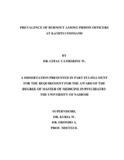| dc.description.abstract | Introduction:
Burnout is a psychological term for the negative response to chronic job-related stress. It progresses over a long period of time when people do not have adequate time to recover physically or emotionally. Research indicates that job burnout affects personal and professional performance.
This study sought to determine the prevalence of burnout syndrome and its possible association with job involvement, job stress, job satisfaction, and organizational commitment among prison officers in Kamiti Command.
The concern for doing this study arose due to the nature of the prison officer’s work which involves supervising and securing an unwilling and potentially violent population, among other challenges faced by prison officer as they carry out their duties. Though there are many causes of burnout, in many cases, burnout stems from the working environment.
Study Design: A cross – section descriptive study.
Results: Out of a total of 286 determined as appropriate sample size for this study, 181 prison officers responded to the questionnaires giving a 62.3% respondent rate.
The mean age of the officers was 38.4 years (SD). 73 (40.3%) of the officers were aged between 26 and 35 years.
Of the total number, 161 (88.9%) were male and 20 (11.1%) were female. Majorities (94%) were married and only (6.1%) were single. Majority (88.4%) officers had at least one child.
All the officers had attended some level of formal education. Up to (87%) of the participants had either secondary level (40.3%) or college education (47.5%).
One hundred and sixteen (64.1%) officers were working in the maximum security section and majority 177 (98.9%) were permanently employed.
On average, the prison officers in this study had high levels of burnout assessed on the low personal accomplishment dimension (mean = 28.3). The mean scores for the Emotional exhaustion (average = 20.7) and depersonalization (average = 6.8) dimensions showed that prison warders experience moderate levels of burnout on these two dimensions.
ix
Based on Maslach’s categorization of burnout 30.9%, 49.2% and 30.4% of respondent experienced high levels of burnout in the emotional exhaustion, personal achievement and depersonalization subscales, respectively.
Comparison of 95% CI showed that the prevalence of high burnout on the low personal accomplishment scale was statistically significantly higher than on the other two subscales.
The factors mostly associated with burnout were marital status p = 0.01 on the low personal accomplishment subscale. Interacting with prisoners was positively correlated with emotional exhaustion (r = 0.14). Low social support at workplace was associated with emotional exhaustion p < 0.001and depersonalization p = 0.027. Poor workplace relationships, high workload, job involvement, job stress, job satisfaction and organizational commitment were all associated with burnout.
CONCLUSION
This is the first study in Kenya to assess the levels of burnout among the prison officers. This study revealed that the prison officers do suffer from burnout. The levels of burnout among the prison officers were similar to levels of burnout seen in medical staff working at Mathari hospital. The levels of low personal accomplishment were higher among the prison officers in this study, than that in the study done among medical staff working at Mathari hospital. The factors mostly associated with burnout were marital status, current work station, interacting with prisoners, low social support at workplace, poor workplace relationships, high workload, job involvement, job stress, job satisfaction and organizational commitment. | en |
| dc.description.department | a
Department of Psychiatry, University of Nairobi, ; bDepartment of Mental Health, School of Medicine,
Moi University, Eldoret, Kenya | |

